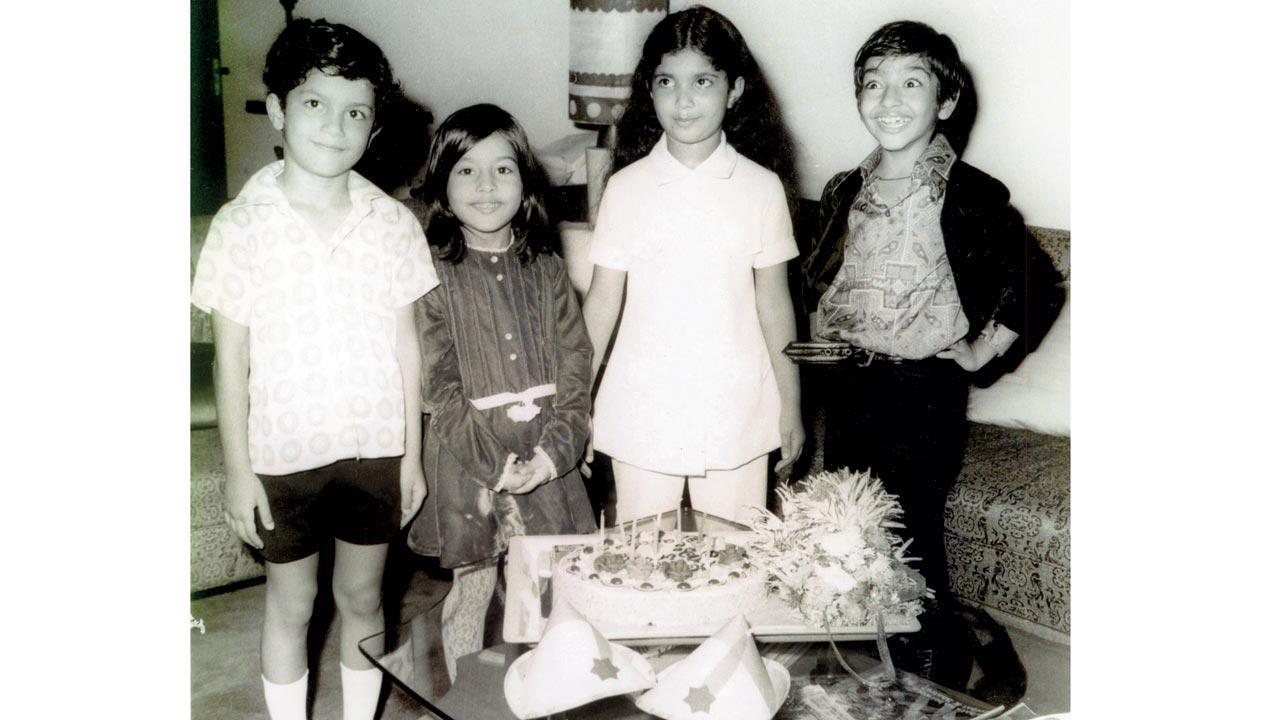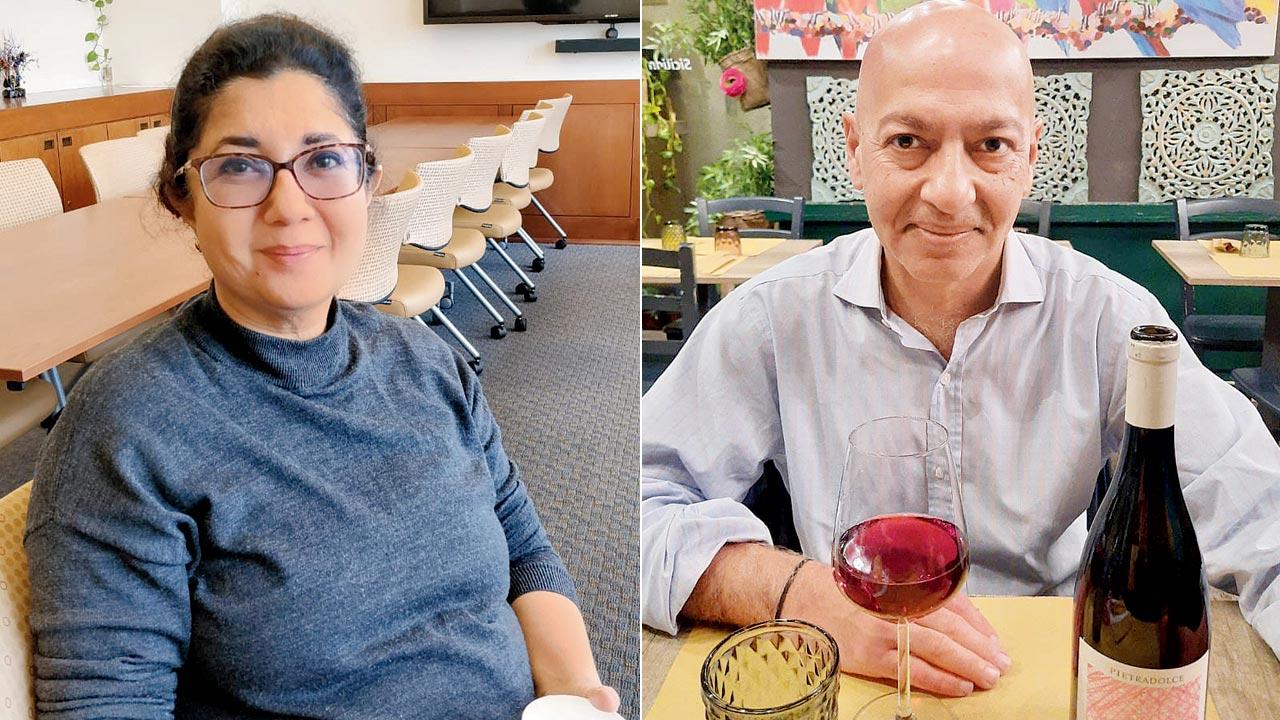Urban chronicler Sifra Lentin and restaurateur Sunnil Panjabi on formative years centred around food and family fun

Young Sifra and Sunnil (extreme right) with their siblings at her birthday party in the early ’70s
 Sifra Lentin, 57, scholar of Indian Jewish history and Bombay communities
Sifra Lentin, 57, scholar of Indian Jewish history and Bombay communities
Sunnil Panjabi, 58, restaurateur and passionate foodie
For over half a century, Sifra (Samuel) Lentin and Sunnil Panjabi share a friendship flourishing between countries, with deep roots in Bombay.
A law graduate, Sifra is now Fellow, Bombay History Studies with the foreign policy think tank Gateway House. She has authored among other publications, the books Mercantile Bombay: A Journey of Trade, Finance and Enterprise, Our Legacy: The Dwarkadas Family of Bombay and Salute to the Sword Arm: A Photo Essay on The Western Fleet. Her journalism columns have included Vintage Bombay, for this newspaper, changed to Vintage Mumbai with the city being renamed in 1995.
 Sifra Lentin and Sunnil Panjabi
Sifra Lentin and Sunnil Panjabi
Following his education at Winchester and Oxford, preceding Cornell Hotel School, Sunnil owned and managed the award-winning Punch Tavern on Fleet Street, home of Punch magazine. Having worked for two Michelin Star chef Raymond Blanc running the Blanc Brasseries, Camellia and Namita Panjabi running Chutney Mary, and Michelin star Veeraswamy, he is currently associated with Michelin Star St John Restaurant in London, the one opened originally in Farringdon in 1994.
Happy to catch up across continents, they present a fine combine of culture and camaraderie while reminiscing on the many ways in which Bombay continues to
inspire them.
• • •
Sunnil Panjabi: Sandra (Sifra’s nickname) and her family moved into the flat next to ours from her birth. We met every day. I remember running round their coffee table listening to Hava Nagila. As children, organising play dates was above our pay grade. My mother was a working mum, happy that my sister and I spent loads of time with Sandra, her brother Bunty and her mother, Aunty Rosie. We also attended Miniland nursery together.
Sifra Lentin: Not only were we Ashoka Apartments neighbours on Nepean Sea Road, but his younger sister Gitu and my younger brother Romiel were just a year apart. We sat on chatais in my home eating dal-chaaval. Among other childhood memories are dinner parties with glamorous guests at Sunnil’s home and trips to our Khandala bungalow.
SP: Her parents didn’t go out much, mine did every night. Our families were uprooted from the homeland. We’re from a nomadic culture as well, owing to Partition. My mother being Sindhi (moving from Hyderabad Sindh during Partition and emigrating to London) had returned with no cousins our age here. Sandra and I were surrogate cousins.
SL: Ashoka Apartments provided a multicultural experience, whether your upbringing was Maharashtrian, Jewish, Parsi, Bohra, Sikh, Marwari or Gujarati. This reflected in the food we tried, the customs we saw. Friday night prayers and visits to temples were normal for us.
SP: Bombay in the 1960s—a melting pot attracting people from all over India—made our upbringing cosmopolitan. Cities accommodating all nationalities have a certain buzz. Bombay homes are welcoming. Living in my London apartment for 20 years, I haven’t been into any neighbouring flat.
SL: Sunnil and Gitu were part of weekend expeditions with my dad to hydroelectric projects and dams in the vicinity of Bombay—Pavna, Vihar Lake, Igatpuri. Creating curiosity for our surroundings, he was the intellectual among us, with a strong sense of history, and knowledge about books, music. We heard stories every evening, Greek and Roman mythology or the Arabian Nights.
SP: The Samuel library was wonderful. Exposed to a family with different interests broadened my horizons. My parents moved to Nigeria, but we returned every
year. During the gap year I took in 1983, I attended St Xavier’s College for three months, which reaffirmed my rooted connection with India.
SL: Through those months, at fab meals in the Panjabi home we experimented with some outstanding global cuisine spreads. Their kitchen had an excellent cook, Ghanshyam.
We ran crazy, competitive races in Sunnil’s hall. Dashing forward, I once hit a window latch with great impact and bled. Nirmala Aunty, Sunnil’s mom, swooped me up straight to the doctor for stitches, rather than worry my mum. When I got married in December 1992, Mumbai was tense after the Babri Masjid demolition. The registration ceremony shifted home from the wedding venue. Nirmala Aunty stepped forward to make food arrangements.
SP: Dividing time between Lisbon and London, visits home have been frequent but brief. We respect and are stimulated by each other. As I run restaurants, we love to try new ones. My interests lie in various types of food, knowing what is in season, discovering what it is that makes people happy in restaurants. I’ve been on the managerial side, though I am a good cook.
SL: He is a fantastic cook. I always knew Sunnil would join the hospitality sector. We chat about everything. His practicality has (hopefully) rubbed off on me and he has a knack for thinking ahead. Sunnil is a great listener, I’m the talker. He is very insightful. Being well-travelled at such a young age makes you worldly-wise.
SP: Sandra is thrilled to explore the heritage of Bombay and communities contributing to its success. Her love for beautiful buildings encourages me to look at them properly, as opposed to just driving by. I admire her enthusiasm for the city structure and dedication to scholarship. Our worlds don’t meet, yet we respect each other’s achievements, discussing viewpoints and values. For one abroad it’s good to plug into what is happening in Bombay. She keeps me up to date.
SL: We pack what we can within rushed weeks and are rarely divided over anything.
SP: Life is too short for arguments. Politically we’re on the same page. Sandra has a great mind, a lot to offer. Bringing up kids and then succeeding at her career
is amazing.
If we hadn’t been Bombay-born then and our parents not as liberal, we might not have such a wide and vivid understanding of the world. I wouldn’t know how to relate to people from all walks of life.
SL: Time spent together early in life leaves a special imprint on the relationship between friends. This city holds us real close.
Author-publisher Meher Marfatia writes monthly on city friendships. You can reach her at meher.marfatia@mid-day.com/www.meher marfatia.com
 Subscribe today by clicking the link and stay updated with the latest news!" Click here!
Subscribe today by clicking the link and stay updated with the latest news!" Click here!










